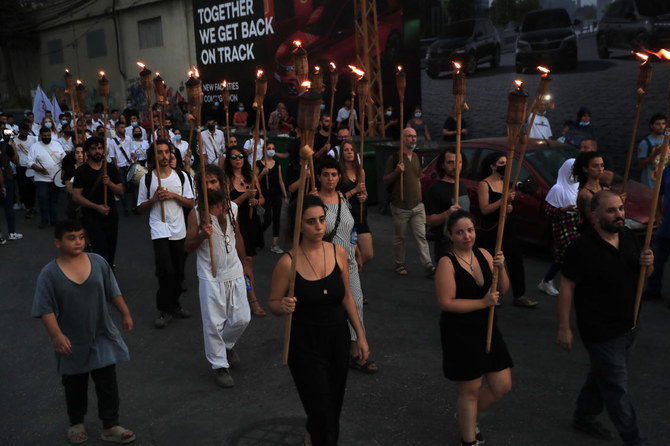BEIRUT: Dozens of Lebanese MPs announced on Wednesday that they will boycott a closed parliamentary session that many people fear will further shield from scrutiny politicians accused of negligence that resulted in the massive explosion at Beirut’s port a year ago.
Speaker Nabih Berri has called for a plenary session to be held on Thursday. It was not clear whether it will focus on a long-running request by judicial investigator Judge Tarek Bitar, and some political blocs, to lift the immunity from politicians and officials so that they can be questioned about their parts in the disaster, or on the formation of a parliamentary investigation committee.
If such a committee is established, parliament would handle the case and it would no longer be under the jurisdiction of the judicial investigator. It would then be up to the Supreme Council for the Trial of Presidents and Ministers to decide whether to prosecute the ministers and MPs accused by Bitar.
The MPs boycotting Thursday’s session said: “It is aimed at bypassing the crime’s judicial investigation.”
Relatives of the victims of the explosion described it as “the session of shame.” They added that they intend to prevent MPs from entering UNESCO Palace in Beirut, where parliamentary sessions are currently being held because of coronavirus precautions, on Thursday.
In a message posted on Facebook, William Noun, the brother of firefighter Joe Noun who died in the explosion, said: “We are going to face the rulers and their apparatus so that they do not approve laws that hide the truth.”
A group representing the relatives of the victims said: “The parliamentary session aims to obliterate the truth and help the suspects escape punishment. The session comes as a continuation of a series of practices that violate the constitution and the law, undertaken by the ruling class to hamper the work of the judicial investigator or set red lines in the way of his work.”
They called on MPs to “prevent parliament from reaching the required quorum or be considered accomplices in the wastage of our loved ones’ blood and the obliteration of the truth and justice.”
The pleas from the relatives of the victims resonated with members of three parliamentary blocs, which confirmed that they plan to boycott the session, which might make it impossible to form a quorum. They are: the Free Patriotic Movement, President Michel Aoun’s bloc; the Lebanese Forces bloc; and the Democratic Gathering bloc, which includes the Progressive Socialist Party and the Damanat Al-Jabal bloc headed by Talal Arslan.
Bitar has been under pressure from many sources since taking over the investigation in February from Judge Fadi Sawan, who was removed from the case after accusing a number of individuals of negligence that led to the explosion.
Hezbollah Secretary-General Hassan Nasrallah added to the pressure on Bitar a few days ago when he described the investigation as “politically driven.” He criticized the judge and challenged him to “provide the evidence based on which he decided to summon current and former officials for questioning in the case.”
Nasrallah added “either (Bitar) works clearly or the judiciary needs to find another judge to handle the case.” He also rejected accusations that Hezbollah was involved in the arrival of the explosive materials at the port.
The devastating blast on Aug. 4, 2020, was the result of a fire in a warehouse where 2,750 tons of ammonium nitrate was stored without proper safety precautions along with a large quantity of seized fireworks. At least 218 people were killed and 7,500 injured by the explosion, which caused $15 billion of property damage and left an estimated 300,000 people homeless.
Bitar has asked parliament to strip three former ministers, who are current MPs, of their immunity so he can move forward with his investigation. The parliament asked to see the evidence before making a decision, a request Bitar rejected.
















